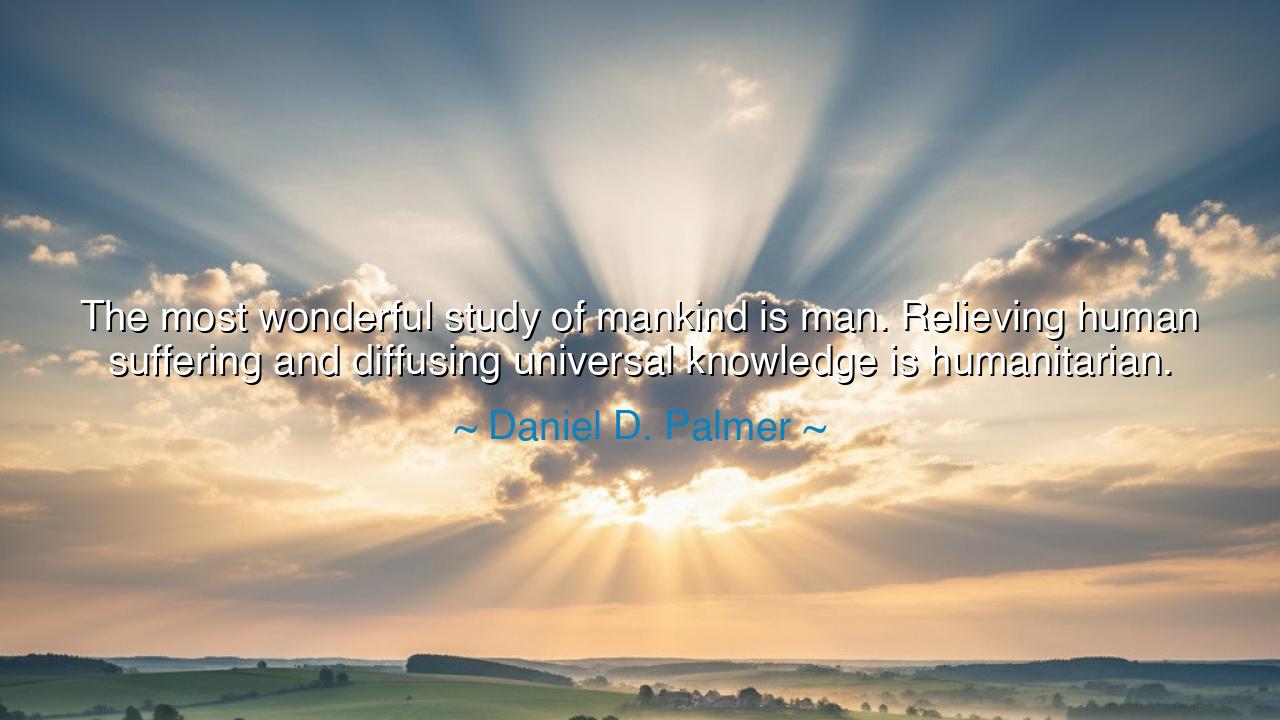
The most wonderful study of mankind is man. Relieving human
The most wonderful study of mankind is man. Relieving human suffering and diffusing universal knowledge is humanitarian.






“The most wonderful study of mankind is man. Relieving human suffering and diffusing universal knowledge is humanitarian.” Thus spoke Daniel D. Palmer, the founder of chiropractic science and a seeker of truth who gazed deeply into the mystery of the human body and the human soul. In these words, he declares a truth as old as civilization and as fresh as every sunrise: that the greatest subject of study is not the stars in the heavens nor the beasts of the earth, but man himself — his mind, his body, his spirit. To understand mankind is to stand at the threshold of all wisdom, for within the human being dwell the questions and the answers of the universe.
Palmer’s saying is both simple and profound. When he declares that “the most wonderful study of mankind is man,” he reminds us that no discovery, no science, no invention can surpass the sacred task of understanding who we are — what makes us think, what makes us feel, what makes us suffer, and what makes us heal. For the mystery of humanity is the mirror of creation itself. Every heartbeat, every thought, every act of love or cruelty speaks of the same eternal truth: that man is both the question and the answer, both the patient and the physician. To study man, therefore, is to study life, purpose, and the divine.
But Palmer does not stop at knowledge — he weds understanding with compassion. To study man without seeking to relieve his suffering, he says, is to grasp only half of wisdom. True learning must serve the living. The healer, the teacher, the philosopher — all are called to one sacred duty: to lessen pain and to spread enlightenment. Thus, he proclaims, “relieving human suffering and diffusing universal knowledge is humanitarian.” The word humanitarian here is not merely a title, but a calling — the highest expression of what it means to be human. For to lift another from misery, to share truth with those in darkness, is to honor the divine spark within us all.
This truth has echoed through every age of history. Think of Florence Nightingale, the “Lady with the Lamp,” who walked among the wounded soldiers of the Crimean War. She did not study medicine for glory or gain, but to relieve human suffering — to bring comfort where there was despair, cleanliness where there was disease, and light where there was death. Her work was not only an act of healing, but a revolution of knowledge; she gathered data, reformed hospitals, and taught the world that compassion must be guided by reason. She embodied Palmer’s creed before it was spoken — the fusion of science and mercy, intellect and empathy.
Palmer’s own life reflected this union. In founding chiropractic, he sought to understand the intricate harmony of body and spirit. He believed that health was not merely the absence of pain, but the presence of balance. His mission was not to conquer nature, but to cooperate with it — to study man as part of a divine design. Through his work, he offered both knowledge and healing, uniting the physician’s hand with the philosopher’s heart. And in this union, he showed that science without compassion is hollow, and compassion without knowledge is blind.
The wisdom of Palmer’s words stretches beyond medicine; it reaches into every walk of life. Whether one is a teacher, an artist, a leader, or a simple worker, to be truly humanitarian is to look upon one’s fellow beings with curiosity and care. To diffuse knowledge is to lift others from ignorance; to relieve suffering is to give hope where it has been lost. Each act of understanding, each gesture of kindness, is a small but sacred contribution to the healing of the world. The study of man, then, is not confined to books or laboratories — it unfolds in every act of empathy, every effort to make life better for another.
So, my children, take this teaching to heart: let your study of mankind be more than thought — let it become action. Learn deeply, but not coldly; serve wisely, but not proudly. See every human being as a universe waiting to be understood, and every pain as a call to compassion. Seek always to unite knowledge with mercy, understanding with love. For this is what it means to be truly humanitarian — to use what you know to heal what you can, and to share what you learn so that all may grow.
And remember this eternal truth: the greatest subject of study is the heart that beats within your chest, and the hearts that beat around you. To know them, to heal them, to enlighten them — this is the most wonderful study of mankind, and the noblest task to which a soul can be called.






AAdministratorAdministrator
Welcome, honored guests. Please leave a comment, we will respond soon